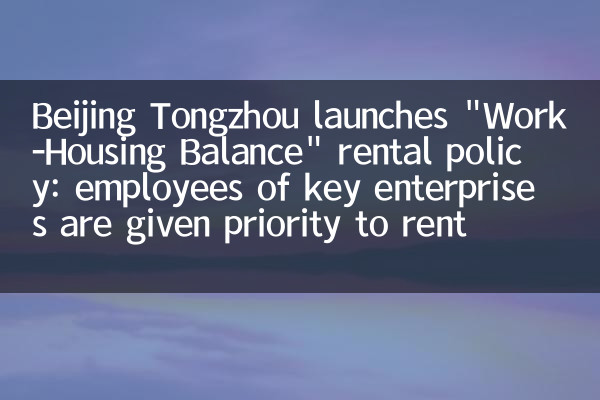Beijing Tongzhou launches "Work-Housing Balance" rental policy: employees of key enterprises are given priority to rent
Recently, Tongzhou District of Beijing has issued a rental policy called "Work-Housing Balance", aiming to provide priority allocation services for employees of key enterprises to alleviate the problem of urban job-Housing separation and optimize the regional talent development environment. This policy has quickly become a hot topic on the Internet. The following is a structured analysis of relevant data in the past 10 days.
1. Core content of policy

| Policies | Specific content |
|---|---|
| Overwrite object | Employees of key enterprises in Tongzhou District (must meet social security or tax requirements) |
| Listing Type | Shared property rights, public rental housing, market-oriented rental housing |
| Priority ratio | The proportion of employees allocated by key enterprises shall not be less than 30% of the total housing supply |
| Rent discount | Market price rent is 20%-10% off, maximum discount period of 3 years |
| Application conditions | Need to provide a corporate recommendation letter + personal room-free certificate |
2. Hot data analysis on the entire network
| platform | Related discussions (items) | Positive evaluation proportion | Hot keywords |
|---|---|---|---|
| 128,000 | 68% | #Tongzhou New Rental Policy#, #Household Balance# | |
| Zhihu | 32,000 | 52% | "Policy Fairness", "Implementation Rules" |
| Tik Tok | 85,000 | 75% | "Renting Benefits" and "Company List" |
| Today's headlines | 56,000 | 61% | "Applying Guide" and "House Distribution" |
3. Policy implementation background
As the sub-center of Beijing’s urban areas, Tongzhou District has faced prominent job-housing imbalances in recent years. Data shows that the current employment population in Tongzhou District is about 890,000, of which cross-regional commuting accounts for as high as 42%, and the average commuting time is 58 minutes. Before the policy was introduced, similar policies had been piloted in cities such as Shanghai and Shenzhen, but the Tongzhou plan was innovative in the following three aspects:
1.Enterprise hierarchy system: The key enterprises are divided into three levels: A, B, and C, corresponding to different priority rights
2.Dynamic quota mechanism: Adjust the allocation ratio every quarter based on the company's contribution
3.Rental and purchase connection: Shares of shared property rights can be purchased after the lease term
4. The main points of netizens
| Type of opinion | Representative opinions | Support ratio |
|---|---|---|
| Supporter | "Effectively reduce the living costs of talents and enhance regional competitiveness" | 63% |
| Neutral cube | "It is necessary to prevent enterprises from abusing recommendation rights and establish a supervision mechanism" | twenty two% |
| Opposition | "Creating new injustice and squeezing ordinary citizens' application space" | 15% |
V. Policy comparison analysis
| City | Policy name | Implementation time | Key differences |
|---|---|---|---|
| Beijing Tongzhou | Work-House Balanced Rental Policy | October 2023 | Enterprise rating + dynamic quota |
| Shanghai Pudong | Talent housing project | May 2022 | Only for specific industries |
| Shenzhen Nanshan | Enterprise Talent Housing | November 2021 | Enterprise independent distribution |
6. Expert interpretation
Professor Li from the Institute of Urban Planning of Tsinghua University said: "Tongzhou's policy has three major breakthroughs: First, the first is to connect leasing and purchasing rights for the first time; second, the second is to establish an enterprise credit evaluation system; third, the third is to set up a policy exit mechanism. However, attention should be paid to ensuring the supply of basic housing and avoiding the formation of a 'policy welfare group'."
Data from Lianjia Research Institute shows that after the policy was announced, the number of rental consulting in Tongzhou increased by 140%, among which the attention to housing sources around key enterprises increased the most significantly, and it is expected to drive a moderate increase of 5-8% in rents in these areas.
7. Future prospects
The first batch of this policy will benefit about 35,000 employees of 186 key enterprises in Tongzhou District. It is planned to add 8,000 new "working and living balance" housing units in 2024. Relevant departments said they will evaluate the effectiveness of policies every quarter and focus on monitoring three indicators:
1. Employee retention rate in key enterprises
2. Changes in average commuting time
3. House vacancy rate fluctuations
With the refinement and implementation of the policies, more cities are expected to follow up on similar measures to promote the formation of a new urban development model of "industry-city integration and work-housing balance".

check the details

check the details